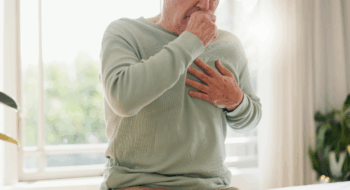As fall arrives, windows are closing, children are back at school and, for many, there’s less time outside. We tend to live in closer quarters as the temperatures drop where germs may be more likely to spread.
Exposure to respiratory viruses like influenza, COVID-19 and respiratory syncytial virus, or RSV, may be inevitable during the winter months, but there are measures you can take to help protect your family.
Hand hygiene
Teach your children good hand hygiene. Frequent 20-second hand washing with warm water and soap, and cleaning commonly touched surfaces like doorknobs, handrails, counter tops and phones will help minimize exposure to germs.
Immunization
Health experts continue to recommend vaccines for influenza, COVID-19 and RSV. These viruses can cause severe illness, particularly in the elderly and those with underlying health conditions.
“The influenza vaccine is the best way to minimize the risk of serious illness,” says nurse practitioner Allison Ferdon, who sees patients at Tidelands Health Pediatrics and Adult Medicine in Pawleys Island. “Early fall is an appropriate time for all respiratory illness vaccines.”
Cough and sneeze etiquette
Use the crook of your elbow or a tissue to completely cover your cough or sneeze. Dispose of the tissue immediately. Covering a cough or sneeze with your palm deposits any expelled germs into your hand, where they can be spread to surfaces or your loved ones.
Stay home if you're sick
Keeping your distance from others is another precaution if you or the person you’re with feels ill.
People experiencing symptoms of respiratory illness should take advantage of at-home tests for all three major respiratory viruses, Ferdon says. There are effective anti-viral medicines for flu and COVID-19.
“If you test positive for any of these viruses, or if you feel sick,” Ferdon says, “it’s important to stay at home for at least 24 hours after any fever is gone without the use of fever-reducing medications. I remind my patients that if they are coughing or sneezing, they may be contagious. I urge them to do their part to keep others from getting sick.”

Allison Ferdon
Family nurse practitioner at Tidelands Health Pediatrics and Adult Medicine
Bio
Allison Ferdon is a family nurse practitioner at Tidelands Health Pediatrics and Adult Medicine in Pawleys Island. She is accepting new patients.
Learn MoreMedical Education
Education
Chamberlain College of Nursing
Meet the Expert
Allison Ferdon
Allison Ferdon is a family nurse practitioner at Tidelands Health Pediatrics and Adult Medicine in Pawleys Island. She is accepting new patients.







